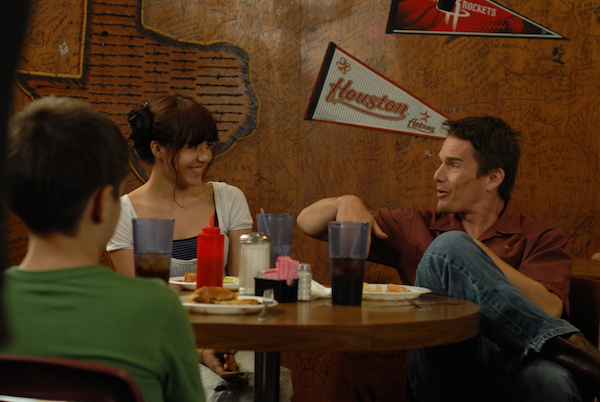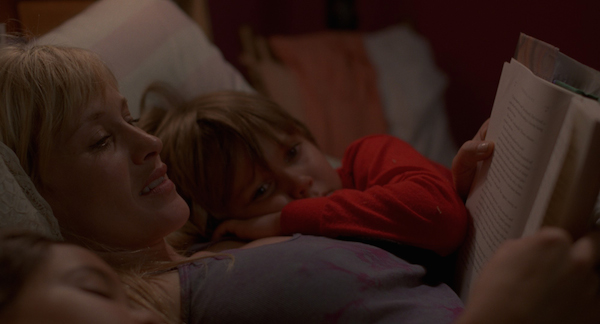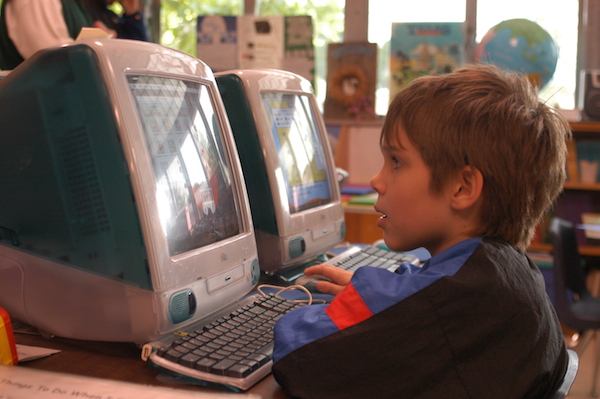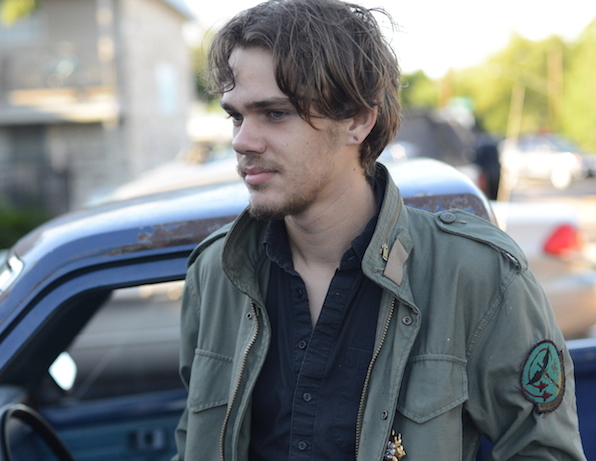I have now seen Richard Linklater’s film “Boyhood” twice – and twice is not enough. It is pure magic. I want to watch it again and again … not just for the flipbook magic of a kid morphing over time into a young adult, which is extraordinary. But the for magic of scenes rendered with such complexity, texture, economy, and craft by writer-director Linklater. For performances that are 100% authentic. For the way this film so accurately captures, in my emotional memory of it, our recent collective history. “Boyhood” is an achievement that takes my breath away.
In 2002, Linklater embarked on “a life project.” He invited four actors to commit twelve years of their lives collaborating on a film that would explore the development of a boy and his family, from the boy’s first year of grade school through graduation and just beyond. Ellar Coltrane was five years old when he auditioned for the title role of Mason in “Boyhood.” Linklater tried to imagine what this young actor might be like when he grew up. Linklater was struck by the intuition that like his musician dad and dancer mom, Ellar was destined to become an artist of some kind. Linklater’s nine year old daughter, Lorelei, campaigned to play older sister Samantha. Longtime collaborator Ethan Hawke eagerly signed on as the dad, Mason, Sr., and Patricia Arquette accepted Linklater’s intriguing proposal to play their mom, Olivia. It is extraordinary that Jonathan Sehring, President of Sundance Selects/IFC Films had the vision to finance the film, defending and renewing the commitment of IFC year upon year, throughout the extended gestation period of “Boyhood.” The risks were great. Linklater’s fears ran the gamut from questioning, “What if Ellar moved to Australia?” to imploring Hawke, “If I die, you have to finish this!”
Linklater conceived “Boyhood” as “a backyard movie,” “an anthropological look at the world.” Like an anthropologist, his observation is thoughtful and incisive. Linklater captures archetypal relationships and crystalline moments – from the trauma of being forced to move, to the joy of first love; from a stone perfectly skipping across a lake, to a little girl jumping up and down with uncontained zeal at a Harry Potter book signing. The film is at once autobiographical for Linklater, personalized for his actors, and universal to all of us. He coaxes his cast members into intimate connection, comparing his role as a director to the man rubbing the bottle to get the genie to come out. “I want the whole film to flow as a memory without a lot of demarcation,” describes Linklater. Perhaps you will remark the resemblance of “Boyhood” to James Joyce’s magnum opus, “A Portrait of the Artist as a Young Man.”
In watching the film, I felt overwhelmed by the remembrance of how little control young kids exert over the circumstances of their early days. During childhood, all of us are really along for the ride in the lives of our parents. We follow Mason in “Boyhood” until he matriculates from high school, departs for college, and achieves alas the right to carve out his own future in the vast unknown before him. As rendered cinematically by Linklater, that final transition is poetic, awe-inspiring, and replete with bittersweet relief.
“Boyhood” which debuted at the Sundance Film Festival in 2014, has garnered numerous awards throughout the international festival circuit, including The Founder’s Directing Award at the San Francisco International Film Festival, the Golden Bear at the Berlin International Film Festival, the Louis Black Lone Star Award at SXSW Film Festival, and Best Film, Director and Actress awards at Seattle International Film Festival.
At the Fairmont Hotel in San Francisco, I was delighted to speak with filmmaker Richard Linklater, an artist whose new films I greet with unbridled anticipation. Linklater is at the top of his original form. He makes directing look seamless, even as he continues to innovate and stretch the boundaries of storytelling. “Boyhood” will likely inspire your childlike awe to wonder how exactly did he do that?

Courtesy of Matt Lankes. An IFC Films Release.
Sophia Stein: “Boyhood” is a beautifully constructed filmmaking experiment. What were the ground-rules from the get go?
Richard Linklater: It never felt like an experiment. It felt like a long-form story-telling challenge. Film necessitates for me a certain mathematical precision; it’s not like a random thing. Every film is a kind of bending the elements to your will. This was just such a big canvas that it necessitated a relinquishing of absolute control to an unknowable future — which was cool. The process was really a year by year incremental growth, within a very tight structure. I knew the last shot. I knew where it was going. The years were kind of planned out. Patricia says that she remembers the first time we talked on the phone for two hours, me telling her everything that her character was going to go through to the very end. So I had the big stuff, and that never changed. Then every year, I had all that gestation time to think. I got to go through life thinking, “Second grade, second grade, what was that? What do I remember?” Then pulling that into some kind of narrative form. It was a fun, pretty amazing life project. My four main actors were just getting a year older every year.
Sophia: You have developed this technique of working with actors and involving them in the writing process which yields the most authentic performances. Ellar describes how you would approach him with the framework of a scene, you would have conversations about it, and those conversations would make their way into the dialogue. Do you transcribe those conversations or take notes?
Richard: It’s a real writerly process. Ultimately, you’re alone at your keyboard writing. It’s based on something that I’m feeling. A lot of my rehearsal process is actually a subtle and persistent rewriting to customize the dialogue. The new ideas you have down the road are [based on] what the actors can bring to it. I’m not so obsessed with the written word as I am with realistic dialogue and communication of ideas via that dialogue.

Richard Linklater’s BOYHOOD. Courtesy of Matt Lankes. An IFC Films Release.
Sophia: What was it like to direct your daughter, Lorelei, at 9 years old versus at 21 years old?
Richard: Easy! — I don’t know how to put it, it was just so easy and natural for us; it wasn’t a big deal. She had grown up on movie sets. She had known Ethan her whole life. This was a family thing. It was just a fun thing to do every year – from a father-daughter-family standpoint. When Lorelei was young, she really wanted to do it. She sort of ‘took’ the part. Once she realized there was a part for a girl her age, she said: “Oh, I’m playing that.” I was like, “Great! I’ll know where you are every year. One less volatile thing in our mix.” At least had a little bit of control over her availability. Our delicate chemical balance. It probably meant different things to her at different times. At one point, Lorelei really didn’t want to dress up in that Harry Potter costume, and she asked ‘Can my character die?,” but I think the artist in her ultimately appreciated the scope of the thing she was involved in. Lorelei has become more of a visual artist, a painter. She’s studying in college out here in Oakland.
Filming was something that I think that everybody looked forward to every year. It was like summer camp and art camp combined. And a family reunion! All those things.
If you think of it from the kids point of view, there was no accountability. There was no final product. Most kid actors, you come together and make your movie, and then the next year it’s out, and then all your friends are seeing it. They never had that. All they had was the fun process part. Only now as young adults are they having to deal with all this. It’s a heavy thing — it’s a huge thing that Ellar and Lorelei have been through. I don’t think there have ever been actors quite in their same position.
These are fictional people that they played. Ellar and Lorelei are not their characters. But the performance is a record of what they looked like through those years — that goes for Patricia and Ethan too, certainly. So it’s kind of a brave thing for the actors. Actors are brave people, let’s face it.

Richard Linklater’s BOYHOOD. Courtesy of Matt Lankes. An IFC Films Release.
Sophia: In the film, Olivia becomes a professor of psychology. In one scene, she lectures her students that human survival depends on us falling in love — mother & child, and if that doesn’t happen, “you are doomed,” “you are tiger kibble.”
Richard: [laughs] Exactly.
Sophia: All of the relationships in the film are transient, except those of the parents and their children. They are the only relationships that survive that test of time.
Richard: And siblings.
Sophia: Was that deliberate by design in your conception?
Richard: I was really trying to make a portrait of parents and kids. It’s Mason’s point of view, but it’s really a view of this family. Even though the family is kind of fractured and takes different forms throughout this thing, Mason and Samantha do have that steady presence of a parent who does care about them, for better or [worse]. Whether or not they make the best choices, you see how complex life is for Olivia and Mason, Sr. — just getting through the world, nothing is easy, and they do the best they can. When you’re a kid, no one can say, “Your parents are doing the best they can.” It’s like, “So?! This sucks!” You don’t care. All you see is how it effects you. I think it is ultimately a portrait of two parents who really do care about their kids and are doing their best — but they can’t do everything.
Sophia: The male characters in the film are very authoritarian.
Richard: Hey, they’re males.
Sophia: I was impressed by how economically you were able to portray the sense of violence of the husbands. How did you arrive at that economy? Did you shoot more scenes and then edit them down?
Richard: It was always planned to just show a little bit. Those relationships are from the kids’ point of view, too. That step-parent relationship – whether it is a step-mother or step-father, can be volatile to the kid because suddenly that step-parent is in your space. I wanted to really capture the way a kid reacts. “There is this new authoritarian figure in my life. You know, I didn’t ask him to be here.” He is just suddenly with your mom. It’s kind of a turf war sometimes. It’s tough on the parent too, suddenly they have to be parenting this kid that isn’t theirs. It’s sometimes a fraught relationship.
Sophia: The darkroom chat with Old Mr. Turlington –
Richard: Yeah, one more male in your face, giving you advice.
Sophia: He challenges Mason’s dreams of becoming an artist. “It’s not going to happen for you,” he pronounces —
Richard: He is challenging Mason that if he doesn’t work harder, it’s not going to happen. He tells him that he has talent, but that with no hard work, that talent equals nothing. Turlington thinks he has given Mason an effective kick in the butt. There was always someone in my face kind of saying, “Hey, you’re special, you can do this. But if you don’t do this, it’s all going to be [wasted].” So Turlington is gently encouraging Mason, complimenting him — and giving him a kick in the ass. When he says, “Maybe twenty years from now you’ll thank me,” he’s thinking, after Mason is successful, this talk will be the thing that motivated him a little bit. Everybody is trying to motivate people. It is hard to say what motivates anyone though, isn’t it? People respond differently.

Courtesy of Matt Lankes. An IFC Films Release.
Sophia: You have commented that “It was weird to be shooting a period film in the present.” What did you mean by that?
Richard: When we began the movie, it was 2002. So today, you are looking at different computers and games, at the culture and fashions of that moment. We didn’t have to go out of our way to do production design. It was the world as we were catching it. Twelve years later, I would see that the only thing that had changed much was really in the technological realm. The world largely looks the same, while the technology demarcates the passage of time.
Sophia: The way that your film captures the technology that is changing at breakneck speed is rather amazing. Also, you capture the changing political tides.
Richard: We didn’t know necessarily that Obama was going to win that election, but we showed them canvasing for him. We were in those moments.

Courtesy of Matt Lankes. An IFC Films Release.
Sophia: As a teenager, you imagined that you would write novels. How did you transition from the dream of writing literature to writing and directing films? How did you make that detour?
Richard: With a little detour into theatre. I was writing plays in college. This is all when I was young, thinking novels, to plays, to films in a fairly short amount of time. I was finding my medium. Film was just so all encompassing. It seemed to hit me on a lot of levels. That’s where I found a home. I just love movies.
Sophia: I have seen the film twice, and I want to see it again. It is so beautiful. Not only do you do this flip book of watching this kid become a young adult, but also, the way the scenes are constructed, with all those layers, is remarkable.
Richard: “Boyhood” is this intimate epic. Most epics have epic subject matter. We have an epic story but really intimate moments. People probably haven’t really seen that before.
Top Image: Mason (Ellar Coltrane), age 6, in Richard Linklater’s BOYHOOD. Courtesy of Matt Lankes. An IFC Films Release.
In San Francisco, on Friday, September 18, catch director Richard Linklater in person for a Q&A following select screenings at these theatres: the Sundance Kabuki Theater (7:00 pm) and the Embarcadero Center Cinema (8:00 pm or 8:30 pm).

Courtesy of Matt Lankes. An IFC Films Release.
